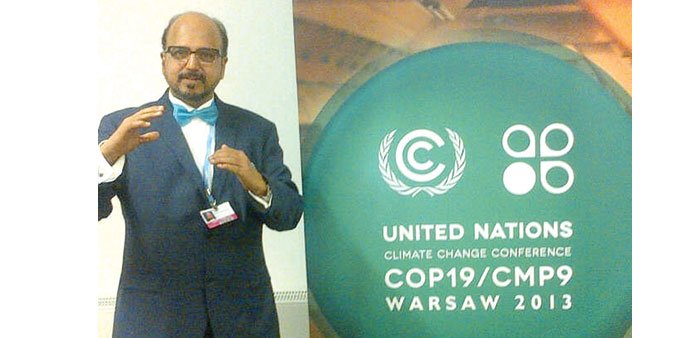The United Nations Climate Change Conference (COP19) is currently being held in Warsaw, Poland. In this context, Doha Bank Group CEO Dr R Seetharaman has stressed the need to build green economies to ensure sustainable global growth and gross welfare.
The level of progress at COP19 will be an indicator of the world’s chances of reaching a deal in 2015, which is the new landmark year in the UN-led process after the 2009 summit in Copenhagen. Developed countries have reiterated their commitment to promises on long-term climate finance support to developing nations, with a view to mobilise $100bn by 2020.
The UN Climate Change Conference (COP18/CMP8) held in Doha last year provided an important platform for global leaders to take necessary steps in response to climate change. The conference came up with “Doha Climate Gateway” to push forward the solutions to climate change.
“The ‘Durban platform’ was notable. The conference led to progress regarding the creation of a Green Climate Fund, for which a management framework was adopted. The fund is to distribute $100bn per year to help poor countries adapt to climate impacts,” Seetharaman said.
Referring to the address of the Philippines’ lead negotiator at the 2013 UN climate talks, in which he highlighted the devastation caused by typhoon Haiyan in Tacloban, Dr Seetharaman said: “He wants clarification on the future of the UN’s Green Climate Fund and sources of the $100bn a year by 2020, as promised by rich countries. A report published by Oxfam underlines why this is such a critical issue. It estimates that between $7.6bn and $16.3bn of climate finance has been set aside by developed countries for 2013. Only the United Kingdom has offered support until 2015.”
He added: “Global warming will lead to a rise in the level of oceans and seas, causing a serious deterioration of the climate over the next 1,000 years. Burning of fossil fuels and the gases produced – especially carbon dioxide – were responsible for most of the temperature increases recorded during the second half of the last century. International efforts to mitigate climate change need improvement to meet the goal of keeping global warming to below 2-degrees Celsius above pre-industrial levels. With appropriate climate and energy policies, renewable energy sources can contribute substantially to human well-being, leading to positive effects - including stabilisation of the climate.”
Seetharaman said: “Climate change is a global challenge that requires an ambitious global response. A green economy will protect the planet from the worst effects of climate change. Hence, it is necessary that we contribute to the development of green economy, which is mainly based on sectors such as renewable energy, green buildings, clean transportation, water management, waste management and land management. Building green economies is the need of the hour for sustainable global growth and gross welfare.”

Seetharaman speaking at COP19 in Warsaw, Poland.
